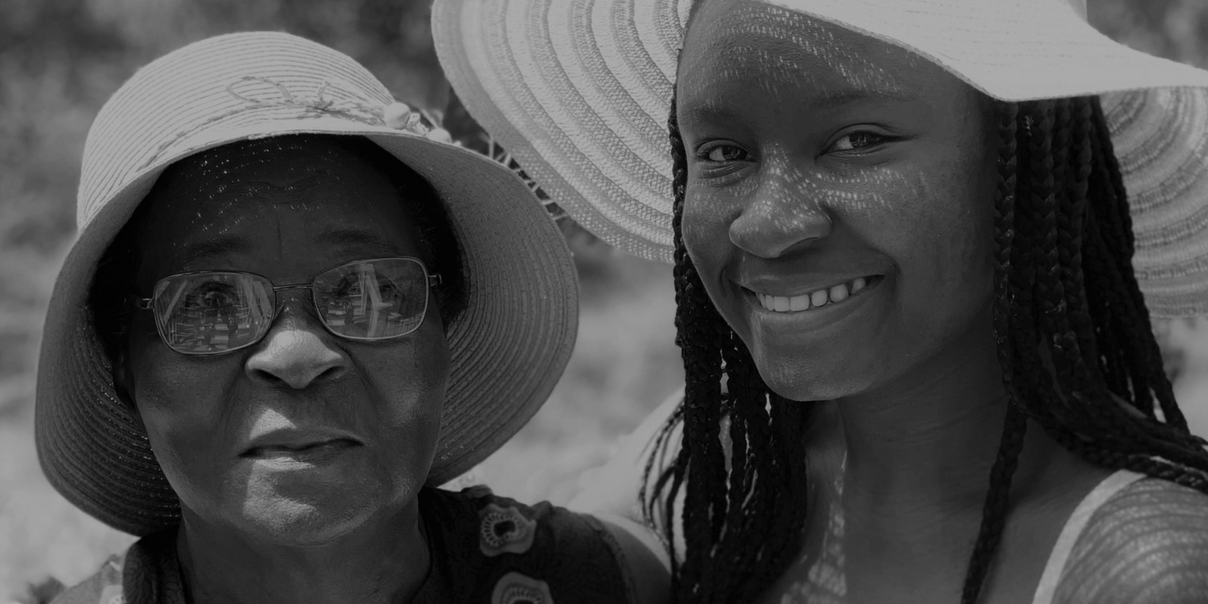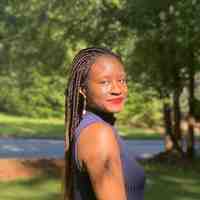
On Grief, Remembrance, and Theatre
Meet the Participants

Charlene Adhiambo (she/her/hers) is a Kenyan American writer currently based in her hometown of Atlanta. Her one-act play Guardian was read at Saudade Theatre’s Re-Descobrimentos Festival in July 2020. Her creative work spans many mediums including (but not limited to), screenplay, stage play, fiction, essay, poetry, and song. While the containers and even genres of her work change, constant themes are mother- and daughterhood, black girl- and womanhood, friendship, romance, and grief. She writes in a space somewhere between Ray Bradbury and Toni Morrison, two of her favorite authors. When not writing, she is listening to R&B music, teaching herself guitar, or doing yoga. She received her B.A. in Creative Writing and English Literature from Columbia University.
On July 19, 2020, I made my theatre debut with my short play “Guardian”, which was read virtually at Saudade Theatre’s Re-Discoveries Festival, which aimed to examine the legacies of colonialism and racial oppression through theatre. “Guardian” is about a young girl, named Anyango, who meets a strange customer, another young Black girl named Alaro, while peddling her fruit. My play was inspired by my grandmother, who passed away in November 2019. A few weeks before her death, I called her from New York City, as she was in the Atlanta airport about to leave for Kenya. She sounded exhausted, maybe even a little sick. I was worried about the weariness in her voice, but I kept my tone bright. I told her I couldn’t wait for her to return in May, for my graduation from college, something my entire family had been talking about all year. I asked her if she was ready to go home, and she was but wished I was there to see her off. I told my grandmother I loved her. She said I love you back. That was the last time I spoke to her.
Three weeks later, my mother called me to tell me that my grandmother was in the hospital battling sepsis. For a fortnight, my mother called me to give me updates on her health, which fell and rose like tides. At the end of those two weeks, I received two calls. The first was in the daytime. My grandmother had taken a turn for the worse after having a few days of lucidity. I had been on my way to class as I received the call. I sat outside the classroom to cry for a few minutes, went to the bathroom to wipe my eyes, then joined my class where I sat in silence.
That evening, I was in the cafeteria with a friend. When she left to get food, I received the next call from my father. He didn’t speak for some time, and then he started saying my brothers’ and my cousins’ names. It was a conference call. I stopped breathing. I knew what was coming. My friend returned as I was on the phone, trying to understand, trying to hear correctly, trying to fathom. I don’t remember speaking as she rushed me out of the cafeteria. I remember wanting people to see my pain. I remember us walking across campus to our suite. I remember the tears finally falling. I remember my body folding over itself as I cried. I thought of my mother, who that very day had packed her bags for Kenya. She’d missed my grandmother by mere hours. I wanted to speak to my mother. I wanted to tell her sorry. This was the worst way to lose a mother, while thousands of miles away but en route.
————
In March, I was looking forward to my spring break, closing out my senior spring, and graduation. Then, I was kicked off campus due to the spread of the coronavirus, only four months after my life was upended. When I was home, I received the email that commencement was cancelled. It was my twenty-second birthday. Commencement was how I intended to honor my grandmother, who valued education above all. The moment already would have been bittersweet, but now, it would not even exist. This is the emotional space I have been in during quarantine. I have been inundated with stories of patients on ventilators, dying similar deaths to my grandmother’s. I have faced personal grief alongside the uncertainty of my future and this country’s. I celebrated graduation at home with my parents and brothers, a day that was still special despite its simplicity. And in mid-July, when a friend shared a call for short plays concerning colonization, I knew the only person I could write about was my grandmother.
My first thought, while brainstorming, was that I wanted to see her again. My next, was that I wanted to explore her childhood, which I knew very little about. I had conversations with my mother and decided to rewrite a family story. My grandmother grew up on a Dutch colonizer’s farm, which her father managed. Her father was paid for his work in wages and also the surplus of the produce, and once, my grandmother stole fruit and her father punished her. So, I reworked the story. She successfully and regularly, steals fruit, sells it, and escapes the canings. And, she meets a young girl from the future named Alaro, who is based off of myself.
I imagined my grandmother as a child with big dreams and a bigger personality. My main question was, what if my grandmother dreamed me up? As the saying goes, am I my ancestors’ wildest dreams? Thus, “Guardian” is a story of veneration, remembrance, and joy. Stories of Black women and girls during colonialism are underrepresented, so I also wanted a narrative that focused on them. The science fiction and fantasy elements of time travel and manifestation are my interpretation of the festival’s theme of re-discovery. In many ways, this is an escapist narrative, but I think one that is grounded in my desire to show that mundanity, joy, and comedy are present in all moments of history.
The specter of colonialism is still there, of course, which I represent with my character Big Boss. He is never seen, but frequently mentioned, and he potentially could fire the father character or punish him. In addition, Anyango is selling the fruit not only as pocket money, but in her well intentioned but naive hope to assist her family. However, this story is purposefully not seen through Big Boss or the colonial eye. It is my perspective, my family’s perspective, our history, my lineage. It is about me and my love for my grandmother that spans time and spiritual planes. It is my desire to feel her presence, to know that she is here with me, even if not physically. That I can always find her, when I need her. And that hopefully, she needed me as well, and that I brought her as much joy as she did me.
My favorite aspect of the play is Anyango and Alaro’s friendship. How beautiful the connection between between grandparent and child is. What a gift it is to see that relationship as one of like-minded equals, as two wondrous, curious, goofy, gorgeous little Black girls. I wanted to interrogate guardianship. Who is protecting who in this play? Alaro comes to assist Anyango in her business, but also to encourage her to continue to dream, to laugh, and to play. However, a future exists in which Alaro will be guarded by Anyango, and thus the former views this encounter as a repayment of sorts. Anyango’s father, meanwhile, wants to protect her and himself from material repercussions, but finds that his daughter has as much to teach him as he has to teach her.
These webs of connection I think also reveal the significance of virtual readings, which are becoming more commonplace as the pandemic looms on. Through Zoom, the Re-Discoveries Festival managed to unite an audience of one hundred people throughout the world. My family and friends across the globe were able to attend. If this had been a physical performance, that would not have been possible. The festival was an experiment that gloriously succeeded, as it created a sense of connection and closeness despite every participant, from the directors, to the cast, to the audience, being apart. Similar to how I can feel close to my grandmother despite her passing.
It is not lost on me that the reading of “Guardian” happened eight months after her seventy-seventh birthday, which was November 19. She passed away on November 14. The entire week of preparation for the festival felt like a beautiful gift she had given me and was a divine moment of celebration. Anyango is my grandmother’s middle name. Hearing the actor’s recite her name felt like a prayer. Writing this play and having it performed was a tribute that was beyond my wildest dreams. For my grandmother, however, perhaps it was already in her plans.
Author
Charlene Adhiambo